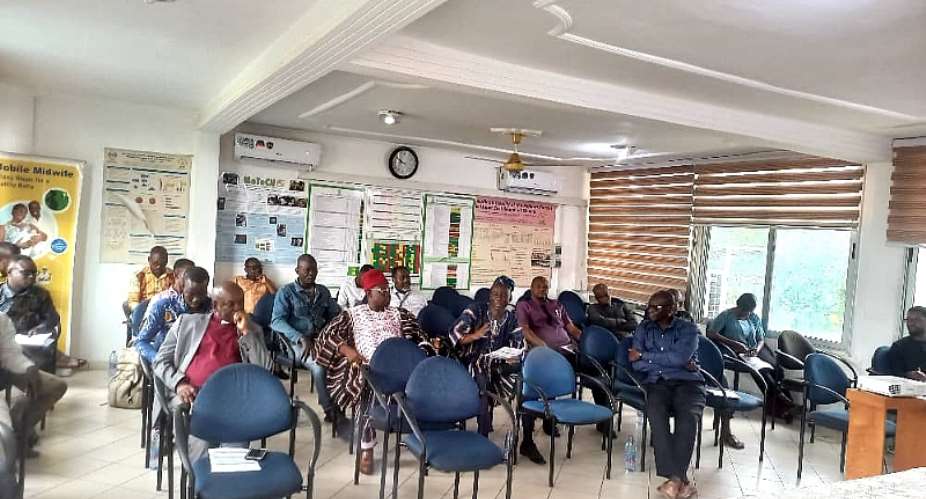A total of 125 animals made up of cattle, goats, sheep and pigs among others have died in the Upper East Region as a result of the outbreak of the Anthrax disease at the end of July, 2023.
Only one person was however confirmed dead as result of the disease.
Six Municipalities and districts in the region namely the Bolgatanga and Kassena-Nankana Municipalities, Bongo, Talensi, Binduri and Bawku West Districts recorded positive cases of the Anthrax disease.
Also, in the first round of vaccination which ended before the lifting of the ban in early July, 2023, a total of 121,961 animals made up of cattle, goats, sheep and pigs were also vaccinated.
Dr Henry Nii Ayi Anang, the Upper East Regional Director of the Veterinary Services made this disclosure during a quarterly Regional Risk Communication and Community Engagement (RCCE) Subcommittee meeting held at Bolgatanga.
The meeting was organised by the Upper East Regional Directorate of the Ghana Health Service with funding support from the United States Agency for International Development (USAID) Breakthrough Action.
It was part of efforts to train and strengthen awareness creation and community engagement activities in the Upper East Region to control and contain emerging zoonotic diseases such as Anthrax, rabies and Monkeypox among other public health issues.
It brought together stakeholders from the Ghana Health Service, Ghana Education Service, National Commission for Civic Education, Food and Drugs Authority, Department of Agriculture, traditional and religious leaders among others.
On June1, 2023, the Upper East Region recorded its first two cases of the Anthrax disease at Binduri where one person and four cattle were confirmed dead while several others were infected.
The situation compelled the Upper East Regional Public Health Emergency Committee to place restrictions on the movement, slaughtering and consumption of animals particularly cattle and other small ruminants in the region.
However, on July 12, 2023, a statement signed by Dr Bryan Acheampong, the Minister of Food and Agriculture noted that the ban had been lifted, adding that the situation had been contained with no recorded case of the disease since June 14, 2023.
Dr Anang lauded the efforts of the subcommittee for engaging the communities and other members of the public which coupled with the ban on the movement, sale and slaughtering of animals for consumption had helped to contain the spread of the Anthrax disease in the region.
“The ban was a difficult decision and it brought a lot difficulties to people especially those who rely on the animals for their daily bread or income but it was necessary and it has helped us to overcome the threats. Even though the ban is lifted, we are not free yet and we still need to be vigilant,” he said.
The Regional Veterinary Director explained that first phase of the animals' vaccination against the Anthrax disease was done and the directorate had begun receiving vaccines to begin the second phase of vaccination and called for support from all stakeholders.
“The Anthrax disease is endemic in the region now and it is important for all stakeholders to heighten the risk communication to help control its spread,” he added.
Mr Rexford King James Adjei, Upper East Regional Health Promotion Officer, Ghana Health Service, noted that the RCCE subcommittee had been trained on risk communication to engage communities and subjects to help control emerging health concerns.
He said Anthrax, rabies and Monkeypox among other zoonotic diseases were posing serious security threats to the globe and Ghana was no exception and underscored the need for the stakeholders to support to intensify education to ensure that the public was well informed.
GNA





 No basis for OSP’s request for money laundering probe against Cecilia Dapaah —At...
No basis for OSP’s request for money laundering probe against Cecilia Dapaah —At...
 Ejisu by-election: Group petitions IGP to probe Kwadaso MP over alleged bribery ...
Ejisu by-election: Group petitions IGP to probe Kwadaso MP over alleged bribery ...
 EC dismisses video alleging ballot box staffing
EC dismisses video alleging ballot box staffing
 Landguards are emboldened by influential personalities in society — Security exp...
Landguards are emboldened by influential personalities in society — Security exp...
 I believe God can use me to do something good for Ghana – Dr. Bawumia
I believe God can use me to do something good for Ghana – Dr. Bawumia
 Election 2024: Election Watch Ghana files RTI request demanding information on B...
Election 2024: Election Watch Ghana files RTI request demanding information on B...
 Bad name given Kasoa blocking our business potentials – Residents
Bad name given Kasoa blocking our business potentials – Residents
 We’ll resist attempts by Education Ministry to change school uniforms – Institut...
We’ll resist attempts by Education Ministry to change school uniforms – Institut...
 Don’t deny your husbands sex; it's a form of exercise — Nutritionist advise wive...
Don’t deny your husbands sex; it's a form of exercise — Nutritionist advise wive...
 Appiatse disaster: Akufo-Addo to commission 120 housing units
Appiatse disaster: Akufo-Addo to commission 120 housing units
